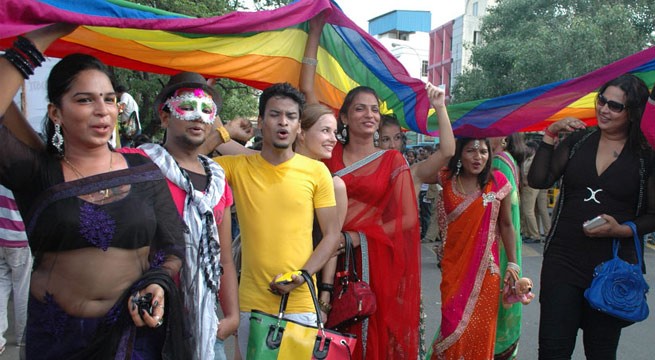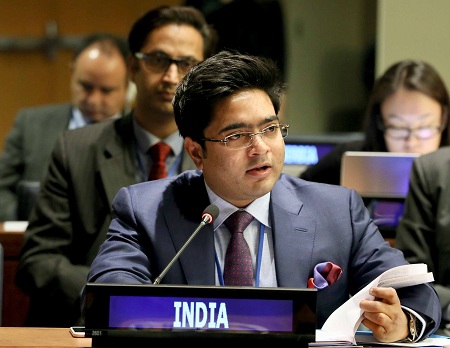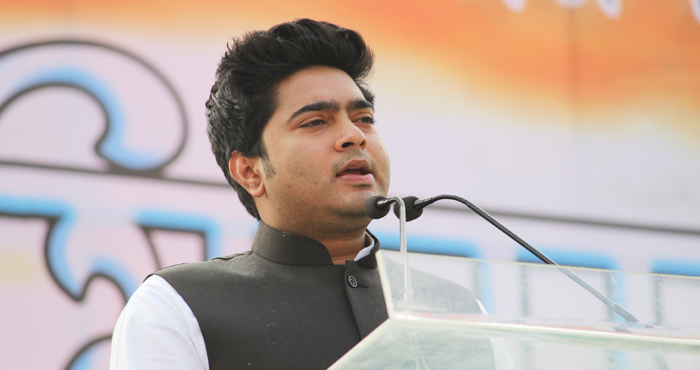Full transcript:
Namashkar Deputy Speaker Sir, Thank you for allowing me to speak on this very important discussion here today.
Humara Prabhu ji here, Prabhu ji se mang kiya aur disha dikhane ki prarthana ki lekin mujhe lagta hai ki Prabhu ji unki kuch bhi nahi sun rahe. Prabhu ji ne desh ki bhi nehi suni, Prabhu ji ne hamara bhi nehi suni, yeh Prabhu ji, na garib ki suni na Prabhuji udyogpati ki suni, na Prabhu ji gharwali ki suni, na Prabhu ji ne kisan ki suni, na Prabhu ji mazdoor ka suni.
Yeh jo unhone pesh kiya isse lagta hai ki woh Prabhu ji woh Prabhu ji is Prabhu ji ka kuch bhi nehi suna.Prabhu ji humara kuch bhi nehi suna. Jo unhono pesh kiya hai hume lagta hai ki yeh budget nehi hai. Yeh budget ka ek chhaya hai. Lagta hai yeh shadow budget hai. Lagta hai ki yeh ek document aisa hai ki desh ki janta ko dhoka dene ka koshish hai.
Isme koi bhi disha nahi hai ki yeh kya karna chahte hai kyuki Budget means a yearly quantitative expression of plans towards assets and liabilities, expenses and variables with a clear road map for the future, for growth of industry concerned.
It is really surprising to note that the Union Railway Budget of this year does not have these features. It clearly appears to be anti-people, aimless and visionless.
I would with all humility request the Hon’ble Minister to go through the Vision 2020 document by Hon’ble Mamata Banerjee, the then Railway Minister when she presented her Budget in 2009 and many projects started during that time have been totally neglected. I don’t know whether it is some kind of political vendetta. I don’t know why these works have been stopped. I just want to point out a very small thing that out of 48 sanctioned projects for RUB and ROB in Eastern India, in West Bengal only five have received funds, that too a petty amount. I don’t know if that amount is enough to buy raw materials.
Show little concern to the people of West Bengal and the country. He has said in his budget speech, that the passenger freights have not been increased.
I would like to draw the kind attention of you Sir, and also to this August House. The first thing this Government did, after coming to power, after being elected by the people, is to take an anti people step of raising the passenger fare with a promise to lower rate, every time the fuel prices were lowered. After that, there have been many times when fuel prices have dipped in international market. So far, we have not received any information of lowering of passenger fare in the country. This is cheating people of the country.
This time the freight fares have been raised. In the previous budget, the passenger fares were increased by 14.2%. In this budget the freight fares were increased by 6.5%. We know that there is a competition between rail and the road for the freight. Why can’t the Railway Minister improve the facilities for the railways, so that the market, being shared by both road and the rail, is taken by the rail? Why can’t low bottom wagons be designed so that the trucks can directly drive into the wagons and be carried to its place and drive away, whether they are laden with coal or other elements?
The present Budget that has being presented to the country is going to affect the core industry. An increase in the freight rates, the core industries like cement, kerosene, urea, food grains and everything is going to be increased. This is going to hit badly, the common man as well as the industry. Growth is going to be restricted. There is a promise that they are trying to initiate growth, but if the core industry is hit then how can growth take place? How can infrastructure be built well?
Yesterday a draconian law was passed and anti person law was passed here. That was supposed to be helping infrastructure. If the freight rate increases, the core industries is going to be hit, so how will infrastructure development take place? In my little brain, I cannot understand. So, I request the Hon’ble Minister to take this into account.
In the same breath, I would also like to point out that from 2009 up to 2011, there has been an increase of the freight volume, carried by the railways, increased to nearly 35%, when Hon’ble Chief Minister of West Bengal, Mamata Banerjee was the Railway Minister. But the last fiscal year has again showed a dip in the freight carrying capacity. So, they should take more attention to the freight, if nation building is one important point that they are looking at.
This will create a burden on the common man, because this will increase the price of the daily used commodities. It will hit the kitchen directly.
In the Budget, it is said that everything will be done with partnership with private players. Our country does not support so much of private activity. It appears that you are going to sell away everything to the private players without proper discussion in the House or addressing the interest of the people.
Trinamool Congress is always committed to the poorest of the poor, to the last man in the last village. We are thinking about that person and at the moment how this Government is functioning it appears to quote Rabindranath Tagore, ‘baniker mandondo dekha dilo rajdondo rupe’ i.e the rulers are trying to act like commercial people. I do not think it is the right attitude.
I would also like to bring to your notice that this Rail Budget appears to be a document, an expansion proposition of an IT company. We are for advancement. We are getting used to sending sms, doing email, we have Wi-Fi zones, that is true but at the same time, this particular document looks like an IT document of the IT sector. It has nothing that we expect from a rail budget.
It has nothing for the 13,33,966 Railway employees. I want to point out that when Hon’ble Mamata Banerjee was the Railway Minister, she had announced that the families of the Railway workers would get certain benefits which included that the children would get educational facilities. There will be seats reserved for them in the medical and engineering colleges. She would have more hospitals dedicated to them. She also had dedicated number of seats at concessional rates for the media people and cancer patients.
Railway is not only a means of transportation, it is the lifeline of a country, it has social obligations, which is totally misled in this budget.
I would like to bring to the notice of this House, plight of poor people. Imagine a poor farmer woman, she picks up certain vegetables, she carries it on her head and tries to go to the nearest market to sell them. Imagine the plight of a little child going to school with her mother for an examination or imagine a youth carrying his blind father to go to the hospital and the checker comes and ask them for the ticket, they are poor, they do not have the ticket, and they are made to disembark from the train. So what did Mamata Banerjee do? She started the ‘Izzat Ticket’ by which the person could travel at the cost of Rs 25 for the whole month. That is not a ticket that is his izzat. That is the izzat of the poor person. That is the izzat of the poor farmer woman, that is the izzat of the sick old blind man – ‘Izzat Ticket’ has been done away with. I am shocked that this country has to suffer in the hands of such decisions taken by an elected Government.
Certain projects were being undertaken for the poor people of West Bengal. It included the dedicated freight corridor, but it remains to be incomplete. We think, the present Government has no intention to develop not only West Bengal, but also the eight sister states in the eastern part of the country. These eight states, like Assam, Arunachal Pradesh, Meghalaya and each of them are suffering poor developmental facilities and poor infrastructure. I do not know how many honourable Members are sitting from Assam, but I would like to draw the attention that there are tea pickers Cheragi in the Barak Valley, who cannot sell their products because the rail track does not go into Cheragi.
There are so many poor farmers in the country, who would have benefited from the Kisan Vision document of Mamata Banerjee, by the cold storage that she was planning to do, by the air conditioned carriage system that she was planning to do. None of them has been mentioned in the documents which we have received now.
Sir, with a very heavy heart, I went page after page in the lecture of the Hon’ble Minister. In the speech, I could not find anything for the State of West Bengal. During the tenure of Ms Mamata Banerjee, she had made the 17th Zone, which was the metro zone. Metro is a fast travelling transit system for the urban people. They go to hospitals, schools and everywhere.
In West Bengal, we had metro projects for – Dum Dum to Airport, Noapara to Barasat sector, Baranagar – Barrackpore – Dakhineshwar sector, Airport to New Garia via Rajarhaat, Joka – BBD. None of it has got requisite sanctions. I would like to draw your kind attention Sir, out of the Rs 2081 Crore required for the Barasat sector; only Rs 140 Crore has been allotted. This appears to be a joke to me.
Not very well to do people from urban and rural sectors, take the suburban trains and the rural trains. Among that, not one single train was announced. It is shocking. Even today, if I need to buy a ticket to go to Kolkata, my waiting list will be around 30,40, 50 and whatever. That means there is a demand for the trains. That means, I will have to wait for 29 other people to cancel their tickets and then I will get confirmation. So, what is the harm in adding another coach in the train? I do not understand. You can use these coaches for advertising to earn money but add on coaches can be used for people who are travelling at a low cost. None of it is here. It appears to be a joke that the Kharagpur Workshop has been given one rupee where Rs 10,000 Crore is still remaining. I do not know why these missed the eyes of the Hon’ble Railway Minister.
In light of the above I would draw his attention to the safety security. The safety security needs premier attention. In this country out of the total number of 30348 level crossings, the number of manned level crossings are 18785 and unmanned level crossings are 11563. Out of the accidents that take place, the consequential train accidents related to death and accidents, the highest sharing is by unmanned level crossings which is 43.22%. The death due to consequential type of accidents that is highest due to unmanned level crossing which is 38.03%. These 11000 unmanned level crossing should be manned immediately or ROBs build.
As per as ROBs go, I was pointing out that in the document it says only 5 have been sanctioned for West Bengal. This again appears to be a joke. The life of people living in West Bengal also very important. I have two level crossings, they are no.26 and no.28 in my constituency in Ashok Nagar and Habra. I have been writing from pillar to post during last two years after Hon’ble Ms Mamata Banerjee had left. She had started the survey there and nobody is even bothered that everyday people are dying in these level crossings.
So out of all these unmanned level crossings or the required ROBs and RUBs some concern must be shown Sir.
We would definitely request these projects, not only for the state of West Bengal, not only for the eastern states, but the whole country as it is looking upto you for their Railway projects and with definite stress on the neglected projects of West Bengal I end on the note of request to please look into this and sanction them.
Thank you.




